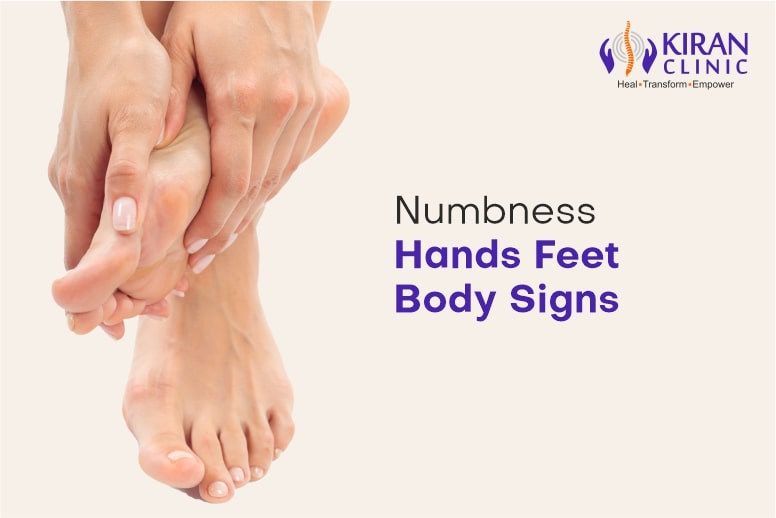Happiness or tingling sensations in your hands and feet can be annoying and frustrating. Such sensations, which many people describe as “pins and needles”, can appear and disappear or last for days, weeks, or even months. But numbness seldom results from an isolated symptom—it’s your body’s method of indicating that something is amiss.
Knowing what is causing numbness in your extremities will enable you to take action quickly and receive the proper treatment. Here, we will discuss typical causes of numbness, what your body may be saying, and when you must seek medical attention.
What Causes Numbness in Hands and Feet?
Numbness is experienced when nerves carrying messages from your hands or feet to your brain become irritated, compressed, or damaged. This interference can result from several causes, such as:
1. Nerve compression or pinched nerves
When the nerves are compressed by adjacent tissues like muscles, bones, or tendons, they can’t work well. Examples include:
- Carpal tunnel syndrome: Entrapment of the median nerve at the wrist, leading to numbness and tingling of the thumb, index, and middle fingers.
- Sciatica: Entrapment of the sciatic nerve in the low back, leading to numbness or pain extending down the leg.
- Herniated discs: Bulging spinal discs compressing nerves in the neck or lower back.
2. Poor Circulation
If blood circulation to your feet or hands is limited, your nerves will not receive enough oxygen and nutrients, resulting in numbness. Circulation can be affected by conditions like peripheral artery disease (PAD) or diabetes.
3. Diabetes
Recurring high blood sugar levels can damage nerves—causing diabetic neuropathy. It often leads to numbness, tingling, or burning in the feet and hands.
4. Vitamin Deficiencies
Insufficiency of some vitamins, particularly B vitamins such as B12, can damage nerves and lead to numbness.
5. Trauma or Injury
Pronounced direct trauma to a nerve due to injuries, repetitive strain, or surgery may cause numbness.
6. Illness
Autoimmune disorders such as multiple sclerosis, infections, or even thyroid disease may result in nerve damage and numbness.
Why You Shouldn’t Ignore Numbness
Numbness is not only unpleasant—it can be a symptom of an underlying serious issue that must be addressed. Disregarding it can result in:
- Progressive nerve damage
- Muscle weakness or loss of coordination
- Permanent loss of sensation
- Higher risk of injury from not being able to feel
Early treatment and diagnosis are essential for optimal results.
How Physiotherapy Can Benefit
Physiotherapy has an important part to play in diagnosing and treating numbness due to nerve dysfunction. Here’s how:
-
Assessment and Diagnosis
A physiotherapist will conduct a thorough examination to determine the underlying reason for numbness, such as posture analysis, nerve tension tests, and movement screening.
-
Manual Therapy
Methods such as mobilisation or nerve gliding may be used to release pinched nerves and enhance nerve function.
-
Posture and Ergonomic Counselling
Improving bad posture or workstation setup lessens pressure on nerves and enhances symptoms.
-
Specific Exercises
Strengthening and stretching exercises enhance circulation, stabilise nerves, and minimise pressure on involved areas.
-
Pain and Symptom Management
The use of modalities such as ultrasound or electrical stimulation is employed by physiotherapists to minimise pain and inflammation.
When to See a Doctor or Specialist
Although minor numbness might be treated with physiotherapy and lifestyle modification, some signs need immediate medical treatment:
- Sudden and extreme numbness or weakness
- Loss of bladder or bowel control
- Numbness after trauma or recent injury
- Increasing numbness spreading quickly
- With extreme pain or muscle wasting
If you notice any of these, get immediate medical attention.
Prevention and Self-Maintenance Tips for Numbness
- Take regular breaks from repetitive work or sitting
- Ensure correct posture and ergonomics
- Exercise regularly to stimulate circulation
- Control underlying conditions such as diabetes or vitamin deficiencies
- Avoid smoking, which compromises the blood supply
Last Thoughts
Numbness in your hands and feet is your body’s indication of distress. Listen and take action accordingly. With proper care, such as physiotherapy and medical management, most reasons for numbness can be cured or relieved successfully.
If you have persistent numbness or tingling, don’t delay. Early evaluation prevents complications and helps you regain comfort and function.
Visit us today to get a professional assessment and personalised treatment plan.


